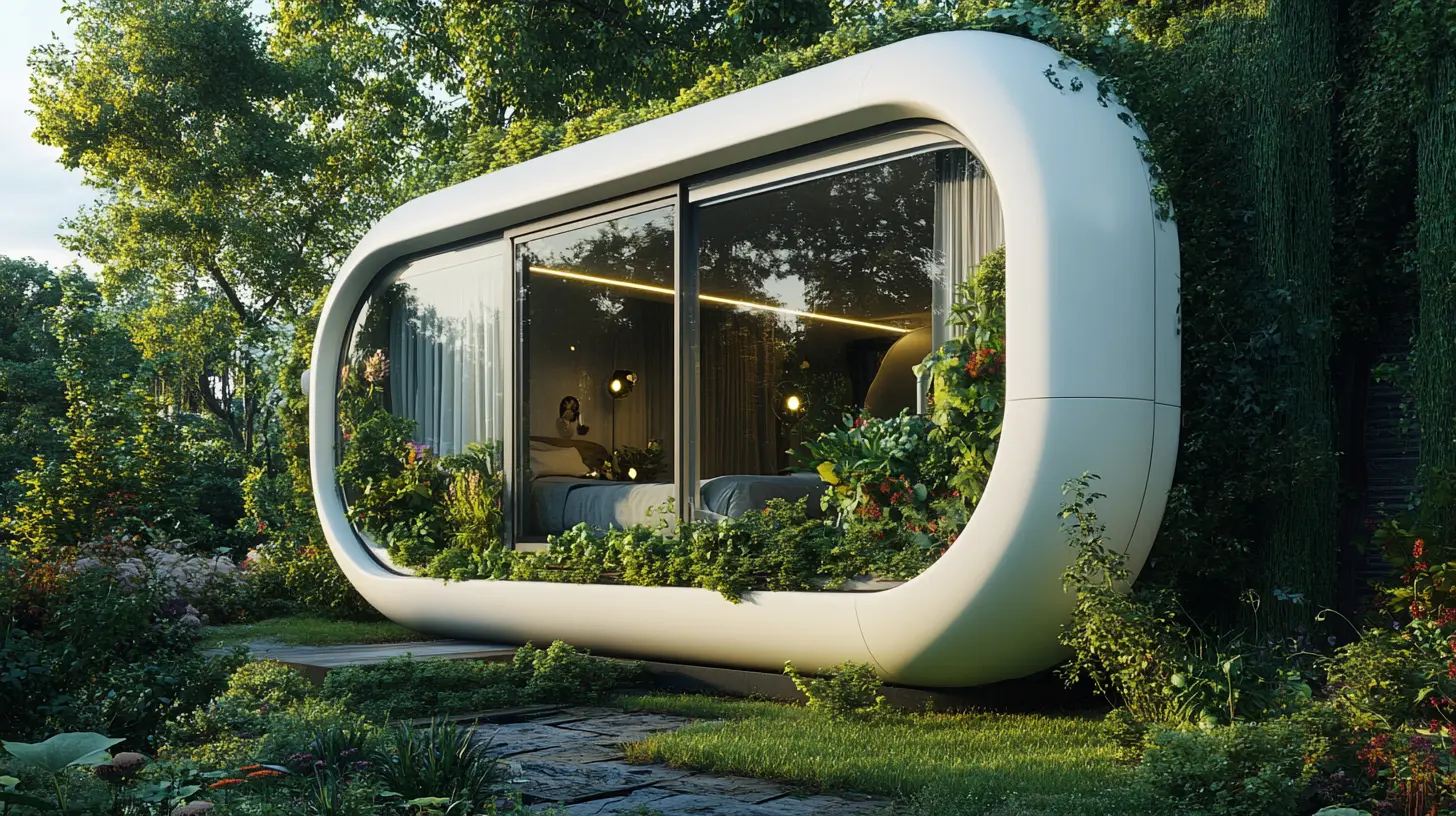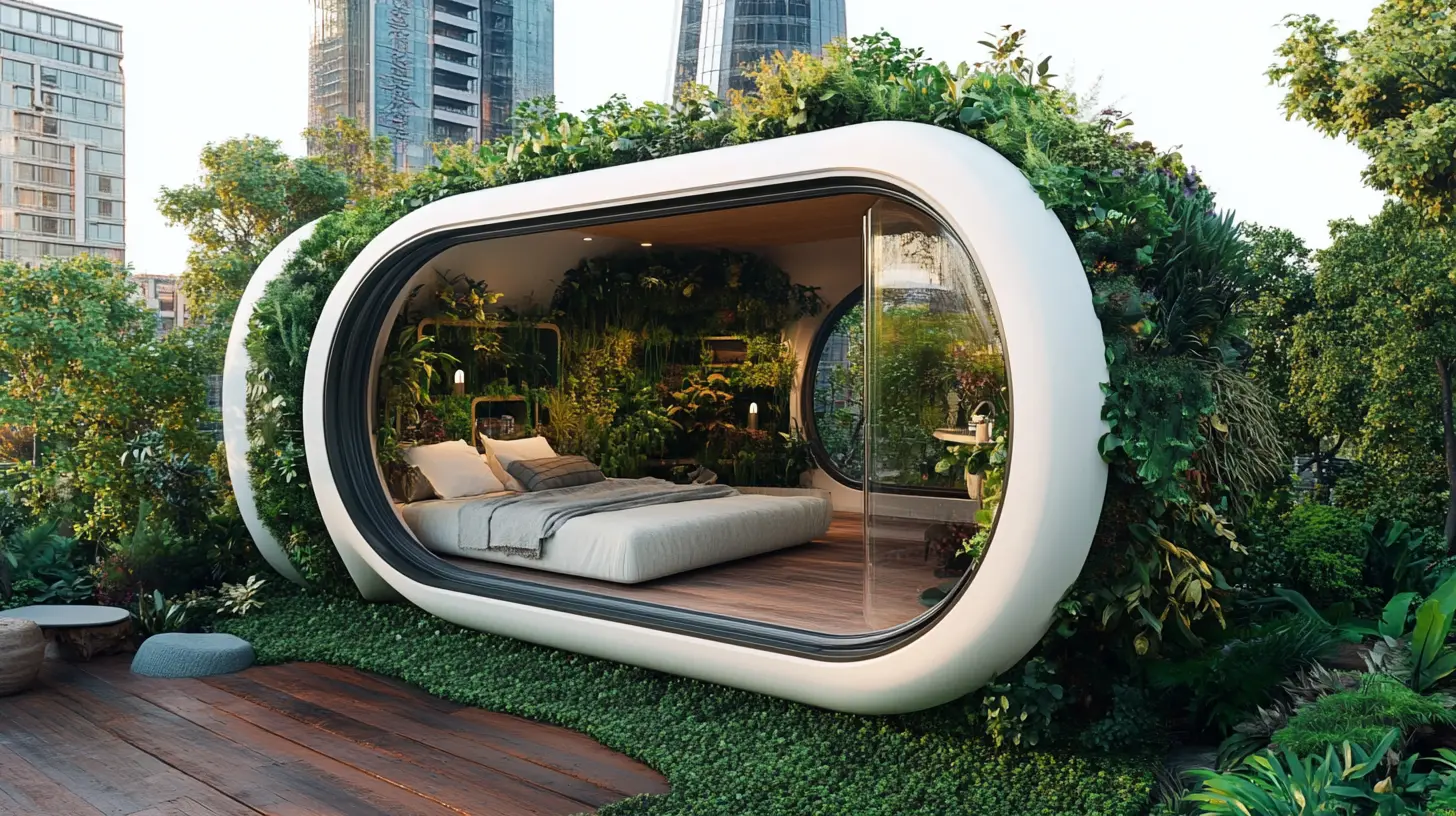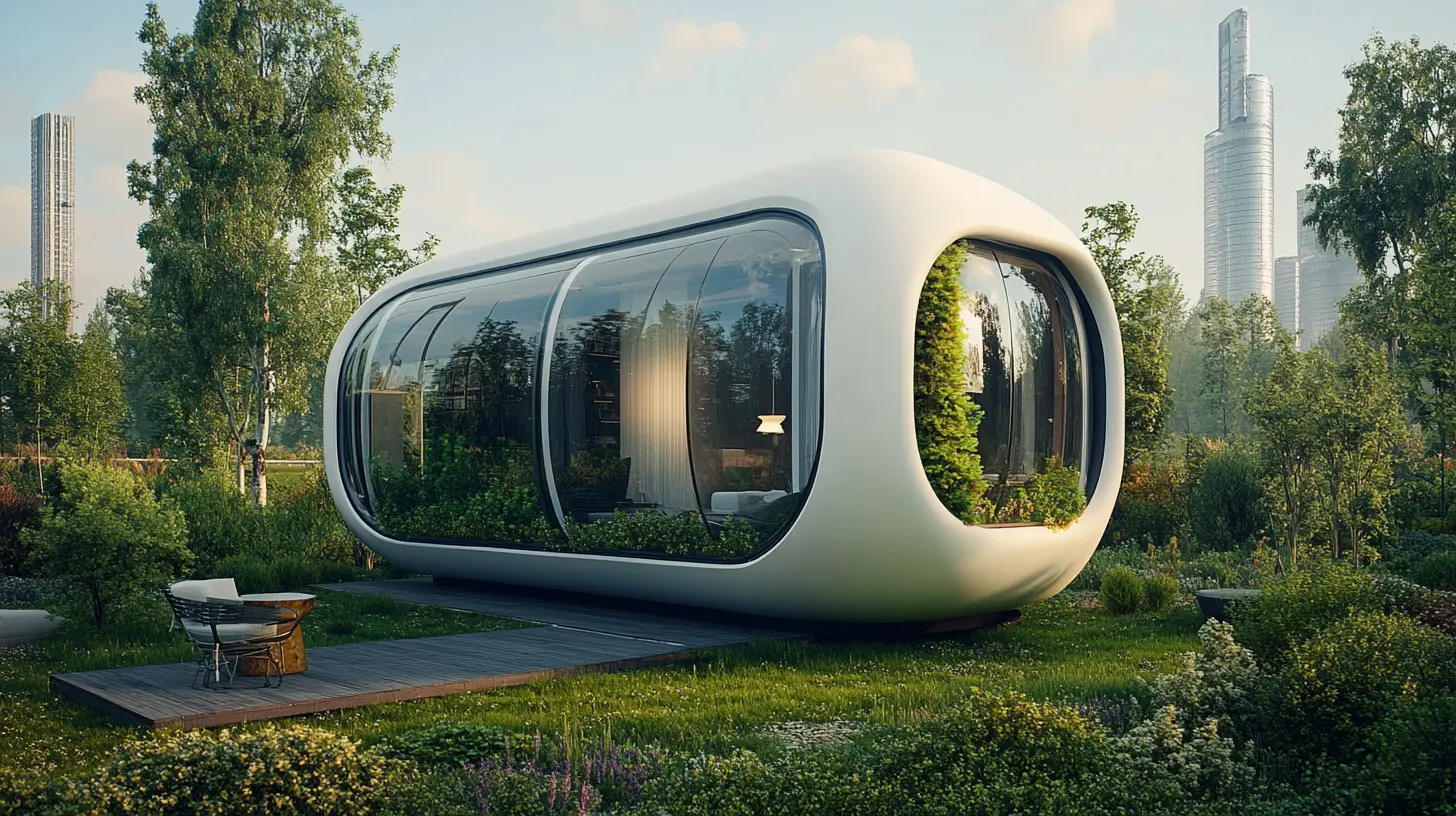Leave Your Message
- Phone
- E-mail
- Whatsapp
- Inquiry
The extended possibilities of sustainable living will thrive in 2025 with the advent of Smart Capsule Houses, where technology and design complement each other. These experimental living concepts propose reduced ecological footprints, increased adaptability, and multifunctionality in the living sphere. Smart Capsule Houses, with their small mass and big diversity for use, will take care of the needs of communities in an urban and rural setting by being comfortable and convenient while sustaining themselves.
At the forefront of this movement is CMER of X-Capsule, a company committed to radically modern living through their products-giving modern life to such innovative functions as modular leisure guest rooms, home workstations, space capsules, multifunctional expansion boxes, etc. The Smart Capsule House embodies this spirit by providing chic and efficient living spaces that seamlessly fit into many settings. With the adopting of these modern designs, people and their communities will not only raise their standard of living but will also help protect and preserve the earth. Therefore, Smart Capsule Houses will become the desirable construction for future wise-minded homeowners.

Smart Capsule Houses will change the whole concept of sustainability in 2025, thus ensuring a combination of cutting-edge technologies and ecological realization. These are compact, modular homes designed to create the most efficient space usage with regards to consumption of natural resources. System integration in smart homes allows residents to control energy consumption as well as lighting and climate control systems, thus rendering more personalized sustainable living. Based on the boom in smart home technologies, smart extra features like scent diffusers help enhance the atmosphere within these capsule houses by immersing relaxation in utility. The projected growth rate from the year 2024 to 2030 of 8.4% represents increased demand for smart solutions appealing to the eco-conscious and modern lifestyle. Smart Capsule Houses are an embodiment of futuristic living where sustainability meets modern technology, thereby creating an environment for healthier as well as more efficient houses.

Moving towards 2025, Smart Capsule Houses appear to be a game changer in sustainable living. These smart houses embrace ecological materials and intelligent systems for energy efficiency and low environmental footprint. One of the most fascinating features is that they are modular, providing easy expandability and customizability according to the needs of the residents while cutting down on construction waste to a minimum.
Furthermore, Smart Capsule Houses have state-of-the-art technology to facilitate optimum resource consumption. Given that the appliances are AI-driven and the home is smart-enabled, residents can monitor their energy consumption in real-time, therefore making a large contribution to a greener lifestyle. The introduction of indoor gardens and sustainable waste management systems further enhances life quality, turning urban living spaces into green oases. As demand for such solutions rises, these smart homes can assume immense importance in the near future for sustainable communities.

While aspiring for a sustainable lifestyle, smart capsule houses are the future of green technologies with new meaning to our environment-centered relationship. These creative short spaces are very beneficial to the quality of life of its occupants and significantly enhance the extent to which a person reduces his/her carbon footprint by introducing integrated advanced solar thermal systems along with efficient water management practices. Renewable energy makes it possible for these inner rooms to keep equipped with adequate facilities while mindful of consuming natural resources.
Moreover, recently formed organization efforts have advocated for empowering communities on supporting a sustainable people behavior. Local sustainable living activities have turned out to be one of so many avenues advertised by eco-conscious designs and smart technologies within reached communities, awareness creation, and room for participation. In such collaborative theatrical arrangements, the local people bring about la better change toward the greener future.

Sustainable development would mean that smart homes would change the way one interacts with one's house. The newest photo-realistic techniques by which the most advanced bringing in advanced technologies through IoT and artificial intelligence are living spaces are enabling people to monitor and optimize energy use. New actions, coming with smart appliances, enable us to use resources efficiently because there is a significant drop in the carbon footprint. Pollution reduction and resource wastage are now the main focus of important exhibitions.
The sustainability hype is growing. The recent exhibitions would show how these intelligent systems could render maximum comfort with the concurrent element of green practices. As consumers become aware of their ecological impact and thus try to change their purchasing patterns, smart homes will be viewed as critical players in the creation of a more sustainable future. They would demonstrate not just technological progress but also a shift towards responsible living, aligning everyday habits with the global vision of sustainable development.
The rising number of people in urban settings and sustainability as a global priority has placed the idea of compact living more in focus, especially smart capsule houses. These houses use space in innovative ways and embrace sustainable practices. Less square footage means less energy usage and a reduced carbon footprint. This path falls in line with one of the UN's Sustainable Development Goals, which talks about resource management for economic prosperity and environmental protection.
Besides the green argument, there are multiple advantages to compact living for residents. Within smart capsule houses are technologies that work to bring comfort and convenience and digital experiences into their daily living. This flexibility allows residents to lead a minimalistic lifestyle without shelving needs; this results in a fusion of one's personal wellness with ecological conscientiousness. The innovations introduced going into 2025 work both toward alleviating the housing problem and ensuring a greener future.
Innovative designs from smart capsule houses are expected to redefine sustainable living in 2025 by giving maximum space with minimum energy expenditure. These small units not only promote nature but also incorporate advanced technologies to maximize comfort and usability. Some case studies show various successful developments worldwide in which these homes integrate renewable energy sources and smart-home systems for an efficient living environment.
One noteworthy trend within the smart capsule houses includes the smart home scent diffusers. With the market slated to grow from $150 million in 2022 to an expected $280 million in 2030, these devices have become an essential feature of modern homes. Through technology, these scent diffusers help improve the ambiance and well-being, thus reflecting the growing importance of creating personalized and harmonious living spaces within the sustainable frameworks of smart capsule architecture.
Urban settlements are turning to technological advancement such as these space-efficient futuristic household designs termed as smart capsule houses and others in their desperate search for sustainable living solutions. They are not just space-saving buildings but also feature intelligent devices such as smart windows for energy-efficient and less environmentally friendly living. This will indeed add to the larger picture where people would need these types of construction due to the fact that, by 2050, the global population will have increased to 10 billion.
Thus, such technologies have a more significant impact on the communities adopting them. Community projects such as organic farming and water conservation emerge from community collaborations in sustainable agriculture, enhancing the local resilience and food security. Adopting such innovations among the local populace makes the culture of social sustainability more deeply rooted and promotes responsible consumption and lifestyle choices. Through education and mobilization, communities may collectively carve a path toward a healthier, greener future for all.
In 2025, there is a critical struggle regarding making and using innovative smart capsule houses for sustainable living. The incorporation of technology and eco-efficiency was mostly anticipated as cities grew denser and almost uninhabitable. One of the foremost issues here is the dualism of advanced technology, such as AI and smart systems, with the fundamental principles of sustainability.
Recent messages in health technology have shown that digital innovation is not limited, however: the most recent is in private mobile medical tools showing how smart design in the foreground can achieve health results. Drawing inspiration from this, architects and developers of smart capsule houses may develop solutions that guarantee user experience but with minimal environmental impact. These must all combine to achieve modern living with sustainable practices.
Smart capsule houses will be the answer for sustainable living in innovation design and technology, which will reach a peak of high advancement by 2025. These mini-compact-efficient homes have advanced systems for optimizing energy consumption and waste reduction, thus addressing the demand for sustainable homes. Smart modular capsule houses will not only give shelter but will also adapt to the lifestyle of the residents.
Futuristic trends suggest that house capsule designs will be more and more integrated with smart home technologies in the future. Examples of the comforts adding up to well-being in a modern home are smart home fragrance diffusers, which are projected to grow from around $150 million in 2022 to $280 million by 2030. This sensory experience will be complementary to smart capsule houses in a rapidly growing trend where comfort interacts with sustainable living.
As cities move towards sustainability, policy and regulations become vital instruments for ushering in innovations such as smart capsule houses. With energy-efficient technologies, these mini-living units will be in a position to solve the housing crisis in 2025 while causing less environmental damage. But sustainable frameworks will serve very little without effective regulation.
Policies will ensure that developers implement sustainable practices-ranging from responsibly sourcing materials to smart technologies reducing energy consumption. Recent examples of urban hospitality, where newer hotel buildings embrace modern conveniences and ecologically friendly designs, show how regulation can push green technologies into all forms of housing. Such incentives are going to give a shot in the arm for a housing scenario that protects the demands of housing yet protects the very environment around.
Smart capsule houses are innovative, compact living spaces that integrate eco-friendly technologies, advanced solar thermal systems, and efficient water management practices to enhance comfort while reducing carbon footprints.
By utilizing renewable energy sources and minimizing resource consumption, smart capsule houses provide a comfortable living environment that aligns with sustainable living principles, thereby reducing the overall environmental impact.
Compact living spaces like smart capsule houses offer increased efficiency in space utilization, lower energy consumption, and a significant reduction in carbon footprints, all while promoting a minimalistic lifestyle that prioritizes essentials.
Local initiatives and events centered around sustainable living encourage community participation and awareness, showcasing the benefits of eco-conscious designs and fostering collaboration for a greener future.
The integration of smart home technologies, such as fragrance diffusers, within smart capsule houses reflects a growing consumer interest in merging convenience with sustainability, enhancing the overall living experience.
By 2025, smart capsule houses are expected to revolutionize sustainable living through innovative designs, optimizing energy consumption, and incorporating versatile systems that cater to diverse lifestyles, thereby addressing housing challenges.
Compact living spaces contribute to the responsible management of resources and promote environmental protection, which aligns closely with the United Nations' Sustainable Development Goals aimed at economic prosperity and sustainability.
Technology is integral to smart capsule houses, providing modern comforts and digital experiences that enhance day-to-day living while optimizing resource use and energy efficiency.
These homes are modular and versatile, allowing for customization and adaptability based on the unique needs and preferences of their inhabitants, thus providing a personalized living experience.

